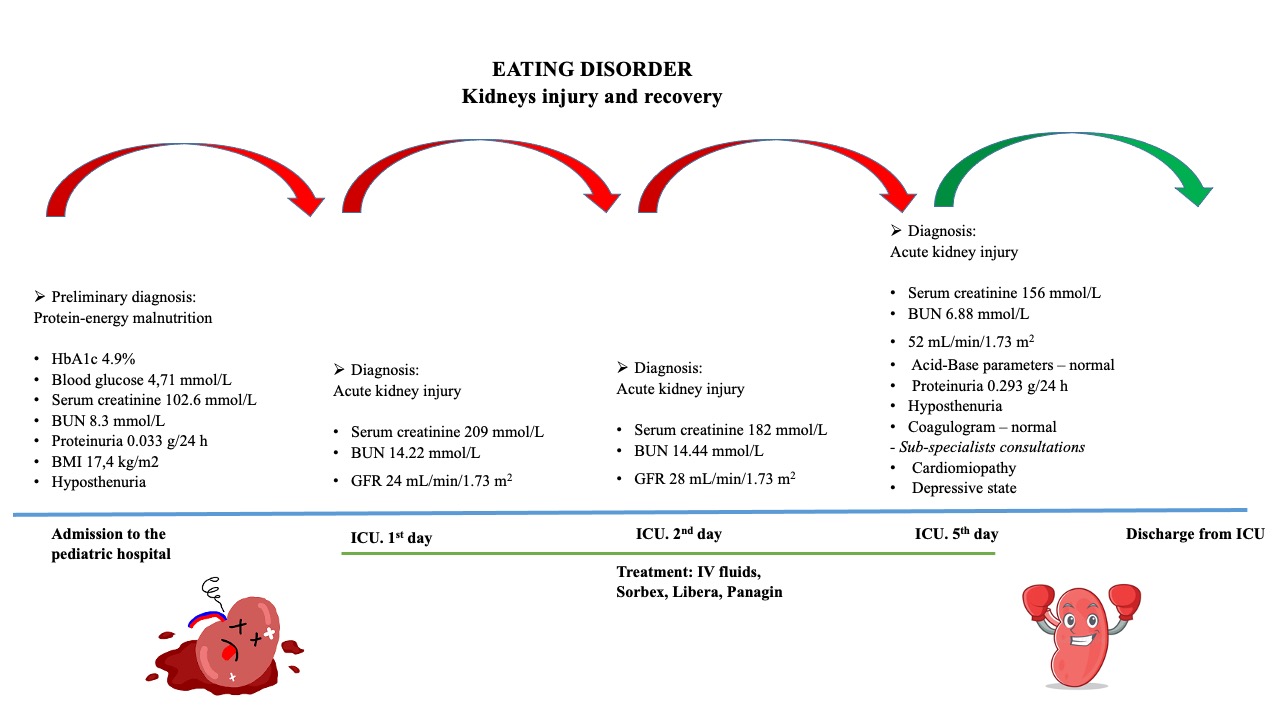Episode of renal dysfunction in a child with eating disorder: a case report
DOI:
https://doi.org/10.15587/2519-4798.2024.300710Keywords:
eating disorder, kidney damage, children, monitoringAbstract
Among the various organ dysfunctions seriously affected by eating disorders (EDs) is kidney damage. The kidneys are vital organs responsible for several essential functions, including the balance of the body's acid-base and mineral metabolism, the removal and excretion of substances, and the regulation of blood volume and pressure.
Eating disorders are a widespread and clinically relevant class of multiorgan disorders that occur mainly in adolescence. EDs often have serious clinical manifestations, which are determined by electrolyte imbalance, endocrine and mental disorders, renal failure, and other disorders. Common eating disorders discussed in the literature and frequently encountered in clinical practice are anorexia nervosa and bulimia nervosa. Anorexia nervosa is a type of abnormal eating behaviour that involves the consumption of very little food and may include intentional vomiting or the misuse of laxatives or diuretics.
Kidneys perform a number of vital functions to maintain homeostasis in our body. One of the main functions of the kidneys is blood filtration and the removal of metabolic products. This allows you to maintain the optimal level of fluid and electrolytes and remove toxins. Restriction of fluid intake and abuse of diuretics can cause a decrease in blood flow to the kidneys and further renal failure. The result of the latter is the development of serious violations of vital functions. Low dietary protein intake in people following a restricted diet (restrictive anorexia) leads to a decrease in glomerular filtration rate (GFR) and renal plasma flow. Treatment of acute kidney injury on the background of volume deficit due to fluid loss involves its termination and hydration orally or with the help of intravenous infusions of physiological solution depending on the severity of volume deficit and kidney damage, which was observed and described in this clinical case.
Aim. To analyze the peculiarities of kidney injury in a child with an eating disorder.
Materials and Methods. A detailed analysis of the case history of a pediatric patient diagnosed with eating disorder complicated with an acute episode of renal dysfunction was done. Basic anamnestic, clinical, laboratory, and instrumental data were analyzed and given in the paper. A graphic presentation is done with PowerPoint.
Results. We describe a 14-year-old female patient diagnosed with ED and acute kidney injury (AKI) leading to intensive care unit interventions.
Conclusions. AKIs can result from a number of conditions that are common among anorexics and include dehydration, high blood pressure, toxins, inadequate nutrition and possibly altered electrolytes. Serum creatinine, blood urea nitrogen (BUN), glomerular filtration rate (GFR), and electrolytes are among the kidney function markers that need to be monitored in the early stages of AKI linked to anorexia. The right medical care, which includes normalizing blood pressure and adequate hydration, leads to the patient's recovery. Further follow-ups on kidney function in such patients are of high importance
References
- Puckett, L. (2023). Renal and electrolyte complications in eating disorders: a comprehensive review. Journal of Eating Disorders, 11 (1). https://doi.org/10.1186/s40337-023-00751-w
- Gurevich, E., Steiling, S., Landau, D. (2021). Incidence of Impaired Kidney Function Among Adolescent Patients Hospitalized With Anorexia Nervosa. JAMA Network Open, 4 (11), e2134908. https://doi.org/10.1001/jamanetworkopen.2021.34908
- Stheneur, C., Bergeron, S., Lapeyraque, A.-L. (2014). Renal complications in anorexia nervosa. Eating and Weight Disorders - Studies on Anorexia, Bulimia and Obesity, 19 (4), 455–460. https://doi.org/10.1007/s40519-014-0138-z
- Coca, S. G., Singanamala, S., Parikh, C. R. (2012). Chronic kidney disease after acute kidney injury: a systematic review and meta-analysis. Kidney International, 81 (5), 442–448. https://doi.org/10.1038/ki.2011.379
- Hundemer, G. L., Clarke, A., Akbari, A., Bugeja, A., Massicotte-Azarniouch, D., Knoll, G. et al. (2022). Analysis of Electrolyte Abnormalities in Adolescents and Adults and Subsequent Diagnosis of an Eating Disorder. JAMA Network Open, 5 (11), e2240809. https://doi.org/10.1001/jamanetworkopen.2022.40809
- Marumoto, H., Sasaki, T., Tsuboi, N., Ito, T., Ishikawa, M., Ogura, M. et al. (2020). Kidney Disease Associated With Anorexia Nervosa: A Case Series With Kidney Biopsies. Kidney Medicine, 2 (4), 418–424. https://doi.org/10.1016/j.xkme.2020.03.007
- El Ghoch, M., Calugi, S., Dalle Grave, R. (2016). Management of Severe Rhabdomyolysis and Exercise-Associated Hyponatremia in a Female with Anorexia Nervosa and Excessive Compulsive Exercising. Case Reports in Medicine, 2016, 1–5. https://doi.org/10.1155/2016/8194160
- Nitsch, A., Dlugosz, H., Gibson, D., Mehler, P. S. (2021). Medical complications of bulimia nervosa. Cleveland Clinic Journal of Medicine, 88 (6), 333–343. https://doi.org/10.3949/ccjm.88a.20168
- Kermond, R., Mallett, A., McCarthy, H. (2022). A clinical approach to tubulopathies in children and young adults. Pediatric Nephrology, 38 (3), 651–662. https://doi.org/10.1007/s00467-022-05606-1
- Dalle Grave, R. (2008). Excessive and compulsive exercise in eating disorders: prevalence, associated features, and management. Directions in Psychiatry, 28.21, 273–282.

Downloads
Published
How to Cite
Issue
Section
License
Copyright (c) 2024 Ievgeniia Burlaka, Inga Mityuryayeva

This work is licensed under a Creative Commons Attribution 4.0 International License.
Our journal abides by the Creative Commons CC BY copyright rights and permissions for open access journals.
Authors, who are published in this journal, agree to the following conditions:
1. The authors reserve the right to authorship of the work and pass the first publication right of this work to the journal under the terms of a Creative Commons CC BY, which allows others to freely distribute the published research with the obligatory reference to the authors of the original work and the first publication of the work in this journal.
2. The authors have the right to conclude separate supplement agreements that relate to non-exclusive work distribution in the form in which it has been published by the journal (for example, to upload the work to the online storage of the journal or publish it as part of a monograph), provided that the reference to the first publication of the work in this journal is included.








